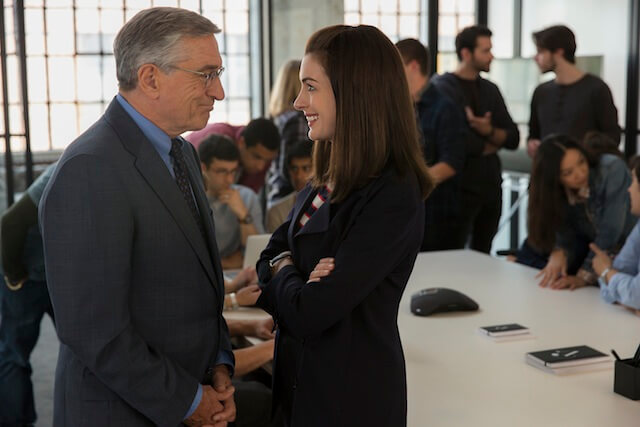‘The Intern’ Nancy Meyers is a sickly sweet and sometimes shameless filmmaker of transgressive ideas — transgressive ideas like: older men, such as Jack Nicholson, should at least consider sleeping with women his age (“Something’s Gotta Give”). Or: people deep into middle age have sex too (“It’s Complicated”). In “The Intern,” Meyers offers two solid, even weirdly necessary messages for the price of one. One, retirees can still offer old school advice to the young, and ones that aren’t tooooo old school, which is to say retrograde. Two, women in positions of power shouldn’t feel bad about wielding power, and shouldn’t even fret over not having enough time to play wife or even mom while tending to their busy career. As always, both of these are caked in a broad, populist and not to say un-entertaining blob that runs a little too long, is a little too soft around the edges and features at least one major misstep. But it’s more engaging than most Meyerses. Robert De Niro, a warm if vaguely pained smile permanently tattooed on his face, plays Ben, a widower who takes advantage of one of those trends the kids are talking about. In this case, it concerns retirees heading back to the work force, this time as unpaid interns. Ben winds up in the Red Hook warehouse belonging to an upstart online fashion company, run, in nearly every capacity, by early 30-something Jules (Anne Hathaway). RELATED: Your handy guide to doing the 2015 New York Film Festival Jules sometimes rides a bike around the office, but she’s otherwise not so whimsical. She works too much, barely having time for her kid or her husband (Anders Holm). If this were another film from another era — or simply another film from another filmmaker — Ben would enter her life to teach her the value of knowing her place in the home as well as in society. He would remind her of the old values we’ve lost in the age of Internet overworking, that family is always first, that men have, as women’s roles have risen in the marketplace, become man-children or, worse, “metrosexuals.” Ben does do some reverse-makeovers on some of the lowly male employees he meets, but he does nothing of the sort with Jules. He gives her pep talks at low moments and assures her that her wish to run her business the way she wants to is something she shouldn’t give up. If this is mansplaining or oldsplaining or whatever it gets dubbed, it’s at least for messages never seen in the movies, or even much in the Internetosphere. OK, “The Intern”’s token major misstep: About halfway through the film, after Ben has warmed his way into the sometime cold and frenzied Jules’ heart, after she’s learned from him to chill out and just do her, after he’s imparted numerous sage and shockingly progressive lessons, he, and Meyers, do something mind-bogglingly stupid. Jules has accidentally sent an email complaining bitterly about her difficult mom to her difficult mom. She comes to Ben in a panic, and here you expect him to take her by the arm and tell her that maybe this is the time for her and her mother to have a heart-to-heart and talk things through. But no. Instead Ben makes an about-face and plots a campy, “Ocean’s Eleven”-style plot to break into her mom’s home and delete the email before she returns. It’s played as a joke — he even does take her by the arm before shifting from grandfatherly advice to high-octane speed-talking — and the whole thing is designed as a mid-film comedic set piece that will score waves of laughter. But it feels wrong, and it undoes a lot of the good will and good vibes it worked so hard to create. “The Intern” mostly gets back on track, and even handles another curveball — one that is a fixture of films like this — with the kind of open-mindedness that is the film’s most winning quality. And it reminds us that movies like this — big, open-hearted, manipulative, light, kind of stupid and occasionally melodramatic dramedies, some made by Meyers herself — can be enjoyable and even fuzzy-feeling-making when done exactly right, or, you know, thereabouts. There’s a relief in giving yourself over to a movie as on-the-nose as this, even when it briefly, halfway through, gives you a reason to fall back on your cozy cynicism and long for a Hong Sang-soo movie or something.
Director: Nancy Meyers
Stars: Robert De Niro, Anne Hathaway
Rating: PG-13
3 (out of 5) Globes
‘The Intern’ lets De Niro teach Hathaway actually progressive lessons

Warner Bros. Pictures
Follow Matt Prigge on Twitter @mattprigge













